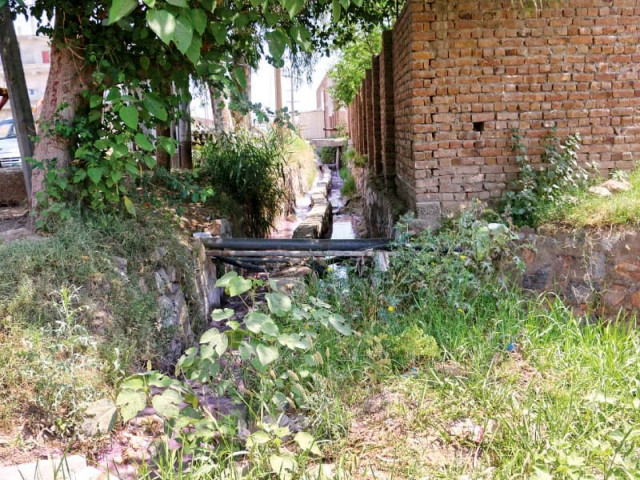Give a hoot, don’t pollute: Industrial waste in rivers endangers aquatic life, poses health hazards
K-PEZDMC CEO says no industrial unit has installed water treatment plants

Contaminated water bodies. PHOTOS: HIDAYAT KHAN/EXPRESS
Not nurturing nature
The toxic waste water from pharmaceuticals, marble, leather and other industrial units in Hayatabad and other parts of the city are discharged into nullahs from which they flow into rivers, especially into Kabul River.
Experts at EPA believe waste water from industrial units with high amounts of chemicals has greater potential to pollute rivers than domestic waste water. Moreover, machinery of the only sugar mill in Peshawar is washed with chlorine before sugarcane cutting season starts. The highly chlorinated water is ultimately discharged into Shah Alam River that joins Kabul River.
EPA official Shamsur Rahman told The Express Tribune the issue has been brought to their notice and coordination with other relevant departments to eradicate the problem was under way.
Threatening aquatic life
According to a survey conducted from August 2011 to November 2011 in International Journal of Fauna and Biological Studies, there were 24 fish species belonging to four orders and eight families in Kabul River.
However, the numbers have declined drastically due to prevalent water pollution. According to officials at fisheries department, fresh water species are said to be under severe stress in Budni nullah, Shah Alam River and Kabul River due to excessive pollution.
“These species have never been as vulnerable as they are now,” Fisheries Department Assistant Director Hidayat Shah told The Express Tribune. He added unchecked pollution has led to a massive decrease in the population of many species of fauna in recent years. “The number of species listed as endangered from fresh water families such as sher mahi is increasing,” he said, adding, the industrial effluent is not only threatening fish but also destroying millions of their eggs.
Shah said sher mahi grows beyond one foot in mountainous parts where rivers pass but its size has been limited to just a few inches downstream due to dumping of toxic waste in its habitat. “The loss to our fresh water species will be disastrous if we do not act immediately,” he added.
He also said according to EPA rules, every factory is bound to install a water treatment plant.
However, Khyber-Pakhtunkhwa Economic Zone Development and Management Company (K-PEZDMC) Chief Executive Officer Mohsin Syed told The Express Tribune no industrial unit has a water treatment plant in the province.
He said according to the new industrial policy, installation of water treatment plants by every industrial unit was made mandatory. He said the relevant departments were also willing to extend technical and financial assistance in this regard.
Mohsin said cost-effective local water treatment plants will be designed which will aid industries and also protect the environment. “These will be installed at new units in Hattar Industrial Estate first where the threat of water pollution is high,” he said, adding, they will then be set up in Peshawar.
Deleterious consequences
The stench that arises from wastewater is a constant source of nuisance for locals. Muneeb Ahmad, a resident of Malakander, said, “A gentle shower makes it extremely difficult for us to breathe because smell from nearby nullahs that carry toxic waste is unbearable.” Furthermore, contaminated water serves as the perfect breeding ground for mosquitoes. Many waterborne diseases have also increased in the vicinity of Kabul River. “People fumigate their houses every 10 days and use a variety of mosquito repellents to avoid malaria and dengue,” said a local, Muhammad Atif.
However, Water and Sanitation Services Peshawar (WSSP) Media Manager Taimur Khan said fumigation is carried out from time to time in these areas. “Each fumigation works for about 20 to 25 days provided that it does not rain since showers render chemicals useless,” he said. He added WSSP had its own complaint centre which can fumigate a locality on need basis.
Published in The Express Tribune, July 3rd, 2016.













COMMENTS
Comments are moderated and generally will be posted if they are on-topic and not abusive.
For more information, please see our Comments FAQ